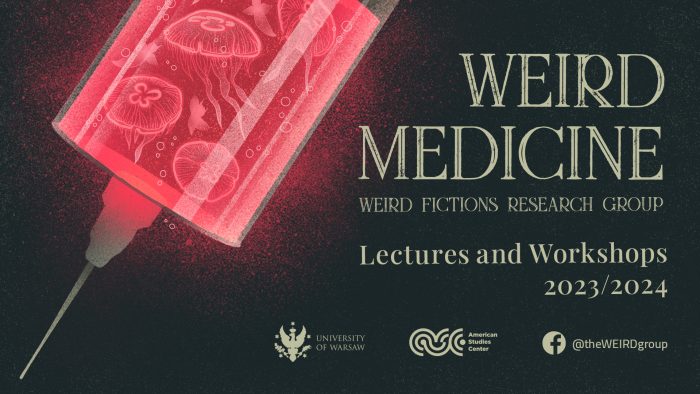Weird Fictions Research Group proudly invites you to the next “Weird Medicine” event!
Anna Maria Grzybowska
The Algernon-Gordon Effect: Rethinking Human-Animal Relationships
Tuesday, March 19, 2024
4:45PM
You can get 3 OZN points for participating in this event.

Where?
Dobra 55, room: 0.256
(the building features some mobility accommodations: ramp and lift)
Register at: a.kotwasinska@uw.edu.pl
Registration deadline: March 18, 10pm
Registration limit: 15 people
What?
Feared, tamed, loved, hunted, protected, or slaughtered, nonhuman animals have always been central to human existence, exploited for food, work, and companionship. Yet despite their ubiquitous presence, nonhuman animals have been rendered selectively visible and pushed to the margins of human consciousness. With the recent flourishing of animal ethics, posthumanist approaches, and general attempts to challenge anthropocentric ways, the matter of nonhuman presence and agency has gained momentum, pressing scholars across disciplines to engage with other animals and acknowledge our interdependence. During this workshop, we will reflect upon the potentialities of Daniel Keyes’ Hugo Award-winning short story “Flowers for Algernon” (1959) to challenge—or not—our relationship with laboratory animals. Considered a classic, the narrative follows the journey of Charlie Gordon, a man with intellectual disabilities who undergoes an experimental surgery to increase his “intelligence.” As his cognitive abilities change in nature, Charlie’s perception of the world, including his lab nonhuman companion Algernon, undergoes a profound transformation. The workshop will delve into questions such as: How does “Flowers for Algernon” illuminate the ethical complexities of using animals in research? What insights does Charlie’s evolving understanding offer about our relationship with nonhuman beings? And, in what ways does the story challenge conventional notions of intelligence and agency, for both human and nonhuman animals?
Who?
Anna Maria Grzybowska is a PhD student at the University of Warsaw. With her dedication to understanding various (not-only-)human ways of experiencing the world, her research focuses on representations of the human psyche—her most recent article “Invisible Cuts: Psychological Violence and Hermeneutical Injustice in *Tau* (2018) and *Upstream Color* (2013)” explores the confluence of psychological violence and SF film—as well as its formation in collision with the complexity of nonhuman beings within the realms of speculative fiction. Her dissertation-in-progress examines speculative visions of human-animal futures, with a particular focus on narrative transformations (or consolidations) of the animal-industrial complex within literature, film, and video games.




